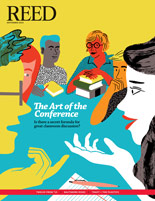
IRIS login | Reed College home Volume 94, No. 3: September 2015
More Fossil Fuel on the Fire
I must say, I like it when my alma mater, including its organ for alumni, challenges us to be engaged critically. I appreciate the work you’re doing and what it’s produced.
Living with a now-retired UC San Diego professor (music) I met living off campus as a Reed sophomore in 1961, I took note of UCSD professor Brad Werner’s paper titled “Is Earth F**ked?” delivered to the American Geophysical Union in 2012. His answer: “More or less.” Another dispatch from the frontier of the great scientific consensus on climate change.
Sojourning in Sydney, I recently read an op-ed in the Sydney Morning Herald by a former fossil-fuel CEO in which he refers to business as usual among his heirs as “crimes against humanity.” The language is not mere rhetoric.
President Obama, that most attractive and hopelessly hopeful of presidents, delivers fine rhetoric on climate change, then spruiks the snake oil of another free-trade agreement that promises to eviscerate any attempt to address climate change that threatens corporate profits (as any serious attempt must) and, perhaps given wind, gives Shell the go-ahead to plunder our Arctic Ocean for more fossil fuel.
Meanwhile, our Reed trustees worry about a rumored “slippery slope”—imagine the carcass of a giant airliner, momentarily afloat, with slides deployed from its emergency exits (a form of escapism)—and what it may mean for “academic freedom.” As the world burns, our trustees fiddle. Denial has many faces.
The question you have to ask: how can it have come to pass that we, with what appears to be willful blindness, fail to recognize catastrophe overtaking us? Of course, there have been many precedents for this kind of behavior, but any notion that a Reed education should be proof against it is at risk. Is the pride we take in our reputed intellect and rigor misplaced? Smug?
All of us are responsible. That’s our problem. All includes 20,000 surviving Reed alumni. We must act. There’s no neutral territory. Reed must divest, and we must bring it about now.
If, still, you insist on your slippery slope, yes, divesting is just a beginning. There’s much more that we can and should do to address climate change. We must be willing to address critically what appears to be complacent understanding of who we are, so that our reputation, let alone academic freedom, may have merit.

LATEST COMMENTS
steve-jobs-1976 I knew Steve Jobs when he was on the second floor of Quincy. (Fall...
Utnapishtim - 2 weeks ago
Prof. Mason Drukman [political science 1964–70] This is gold, pure gold. God bless, Prof. Drukman.
puredog - 1 month ago
virginia-davis-1965 Such a good friend & compatriot in the day of Satyricon...
czarchasm - 4 months ago
John Peara Baba 1990 John died of a broken heart from losing his mom and then his...
kodachrome - 7 months ago
Carol Sawyer 1962 Who wrote this obit? I'm writing something about Carol Sawyer...
MsLaurie Pepper - 8 months ago
William W. Wissman MAT 1969 ...and THREE sisters. Sabra, the oldest, Mary, the middle, and...
riclf - 10 months ago